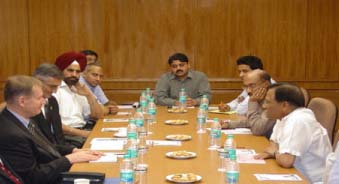
- This event has passed.
Roundtable with visiting delegation from the Asia-Pacific Center for Security Studies (APCSS)
March 18, 2008
Lt. Gen. (Retd.) Edward P Smith, Director, APCSS visited IDSA on March 18, 2008. He was accompanied by Lt. Col. John Gasner, APCSS Chief, Outreach, and Lt. Col. Brian Hedrick, Deputy Chief, Office of Defence Co-operation, US Embassy, New Delhi.
 APCSS is a US Department of Defence executive education, conference, and research centre, established in Honolulu in September 1995. The Centre supports the US Pacific Command in its in-residence and outreach activities designed to help security practitioners expand their knowledge, improve their skills and expand their professional networks of colleagues committed to enhancing effective security cooperation in the Asia-Pacific region.
APCSS is a US Department of Defence executive education, conference, and research centre, established in Honolulu in September 1995. The Centre supports the US Pacific Command in its in-residence and outreach activities designed to help security practitioners expand their knowledge, improve their skills and expand their professional networks of colleagues committed to enhancing effective security cooperation in the Asia-Pacific region.
The programme of the visit included a call-on by Lt. Gen. Smith on Director General IDSA, Mr. N.S. Sisodia, followed by a round-table on security issues. During the call-on, Director APCSS expressed the desire to develop and expand a mutually beneficial relationship with the IDSA.
The Roundtable began with N. S. Sisodia providing an overview of India’s security concerns. Mr. Sisodia focused on the following issues:
- Unipolar World Order
- Rising Asia: Growing Economic Strength, Rising Military Expenditures
- Epicentres of Global Conflicts: Africa, Asia, Middle East
- Nature of Warfare: New Challenges
- Persisting Concerns: GWOT, WMD Proliferation, Iraq, Afghanistan
- Transformational Challenges in India’s Immediate and Extended Neighbourhood
- Non-Traditional Security Challenges, chiefly Energy Security
This was followed by Dr. Ashok Behuria’s presentation on the political transition in Pakistan, which addressed the following issues:
- The poll verdict against Musharraf
- Against Religious forces
- Against GWOT and alliance with US
- Beginning of Coalition politics
- The issues at stake
- Restoration of Judges
- Revocation of constitutional amendments
- Civilianisation of the Army
- Impeachment of Musharraf or curtailment of his powers
- Regional Autonomy, Devolution
- Action against extremist forces
- The Imponderables
- Musharraf-Army equation
- Political Ambition of Asif Zardari and Nawaz Shariff
- The course of confrontational politics : Musharraf vs. Parliament, Judiciary vs. Parliament
- Durability of alliances of convenience
- Reaction of the Extremists
- Role of the United States
Mr. Vishal Chandra then gave a brief overview of the situation in Afghanistan. He stated that NATO forces are crumbling and pointed to their inability to tackle the situation. The Western discourse on Afghanistan needs to differentiate between nation building and state building. In times to come, US relations with Iran, Afghanistan and Pakistan will have a significant impact on the strategic order of Asia.
Other Observations and Comments
During the interactive session that followed, the visiting delegation raised the issue of the role of China in Pakistan. Mr. Sujit Dutta noted that China would continue to enhance military ties with Pakistan irrespective of changes in the administration. China has never wanted a situation of turmoil in Pakistan. Rather, it encouraged stability and perhaps due to this reason it has been supporting President Musharraf.
Dr. Ashok Behuria noted that it was Beijing’s pressure consequent to Chinese citizens being taken hostage that forced Pakistan to undertake the military operation against the extremist forces in Lal Masjid.
Mr. Sujit Dutta pointed out that China has no problem with Islamic militancy per se as long as it is not targeted directly by these extremist militants.
Mr. N.S. Sisodia highlighted the solid US support to Musharraf. A majority of people in Pakistan do not appreciate US intervention in the domestic affairs of their country.
B.S. Sachar raised questions about the US role in the new political administration in Pakistan, and the need for the United States to breach Pakistan’s sovereignty by sending its troops into that country?
Dr. Shanthie Mariet D’Souza noted that there is no unity of effort in the reconstruction process in Afghanistan and that aid is not being utilised optimally.
Dr. S Kalyanaraman pointed out the importance of the United States as a stabilising force in the Asian region. But given that NATO forces are unable to handle the situation in Afghanistan and the possibility of the United States pulling out of Iraq, there is a need to think of other options, for instance, how to internationalise these efforts.
In response to these observations and questions, Lt. Gen. Smith noted that he did not agree with some of the points made, but due to time constraints he cannot engage in a full-fledged debate on these. He stated that the United States believes in dialogue. It is not responsible for all that is happening in the world, therefore one should not expect it to solve all the problems related to international security. Outsiders can never solve regional problems. Extensive co-operation among various states could be achieved in spheres such as education, health and economics and also via cultural exchanges. He quoted the example of how the armies of various countries share the element of mutual respect and admiration even when they fight each other on the battlefield.
The roundtable concluded with the delegation being presented with the IDSA memento and select publications.
Report prepared by Dr. Priyanka Singh.







